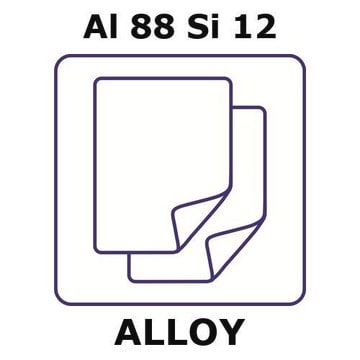Wszystkie zdjęcia(2)
Key Documents
GF65585021
Iridium
wire reel, 0.1m, diameter 0.125mm, as drawn, 99.5%
Synonim(y):
Iridium, IR005106
Zaloguj sięWyświetlanie cen organizacyjnych i kontraktowych
About This Item
Wzór empiryczny (zapis Hilla):
Ir
Numer CAS:
Masa cząsteczkowa:
192.22
Numer MDL:
Kod UNSPSC:
12141720
Identyfikator substancji w PubChem:
NACRES:
NA.23
Polecane produkty
Próba
99.5%
Postać
wire
producent / nazwa handlowa
Goodfellow 655-850-21
rezystywność
4.71 μΩ-cm
dł. × śr.
0.1 m × 0.125 mm
tw
4130 °C (lit.)
mp
2450 °C (lit.)
gęstość
22.65 g/cm3 (lit.)
ciąg SMILES
[Ir]
InChI
1S/Ir
Klucz InChI
GKOZUEZYRPOHIO-UHFFFAOYSA-N
Szukasz podobnych produktów? Odwiedź Przewodnik dotyczący porównywania produktów
Opis ogólny
For updated SDS information please visit www.goodfellow.com.
Informacje prawne
Product of Goodfellow
This page may contain text that has been machine translated.
Certyfikaty analizy (CoA)
Poszukaj Certyfikaty analizy (CoA), wpisując numer partii/serii produktów. Numery serii i partii można znaleźć na etykiecie produktu po słowach „seria” lub „partia”.
Masz już ten produkt?
Dokumenty związane z niedawno zakupionymi produktami zostały zamieszczone w Bibliotece dokumentów.
Low-valent ruthenium and iridium hydride complexes as alternatives to Lewis acid and base catalysts.
S Murahashi et al.
Accounts of chemical research, 33(4), 225-233 (2000-04-25)
The discovery of a new chemical reaction often leads to new applications and new chemical principles. Low-valent ruthenium and iridium hydride complexes are highly useful redox Lewis acid and base catalysts. Nitriles are activated by these catalysts and undergo reactions
Veronica Marin et al.
Chemical Society reviews, 36(4), 618-635 (2007-03-28)
The need for novel materials with luminescent properties and advanced processing features requires reliable and reproducible synthetic routes for the design of suitable materials, such as e.g. polypyridyl ruthenium(II) and iridium(III)-containing polymers. The most popular ligand for those purposes is
Stephen J Roseblade et al.
Accounts of chemical research, 40(12), 1402-1411 (2007-08-04)
Asymmetric hydrogenation is one of the most important catalytic methods for the preparation of optically active compounds. For a long time the range of olefins that could be hydrogenated with high enantiomeric excess was limited to substrates bearing a coordinating
Paolo Tosatti et al.
Organic & biomolecular chemistry, 10(16), 3147-3163 (2012-03-13)
Since their discovery in 1997, iridium-catalysed asymmetric allylic substitutions have been developed into a broadly applicable tool for the synthesis of chiral building blocks via C-C and C-heteroatom bond formation. The remarkable generality of these reactions and the high levels
Soo Bong Han et al.
Chemical communications (Cambridge, England), (47)(47), 7278-7287 (2009-12-22)
Existing methods for enantioselective carbonyl allylation, crotylation and tert-prenylation require stoichiometric generation of pre-metallated nucleophiles, and often employ stoichiometric chiral modifiers. Under the conditions of transfer hydrogenation employing an ortho-cyclometallated iridium C,O-benzoate catalyst, enantioselective carbonyl allylations, crotylations and tert-prenylations are
Nasz zespół naukowców ma doświadczenie we wszystkich obszarach badań, w tym w naukach przyrodniczych, materiałoznawstwie, syntezie chemicznej, chromatografii, analityce i wielu innych dziedzinach.
Skontaktuj się z zespołem ds. pomocy technicznej


